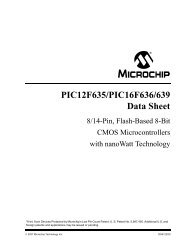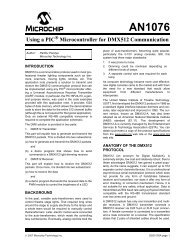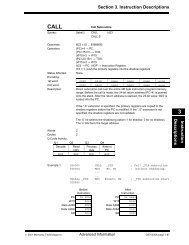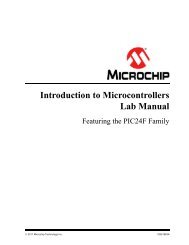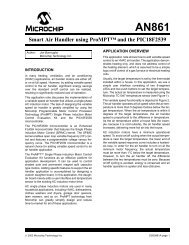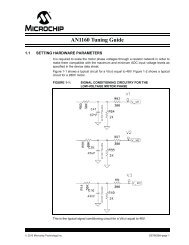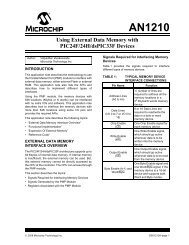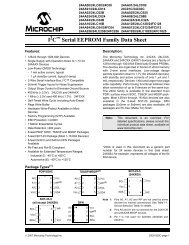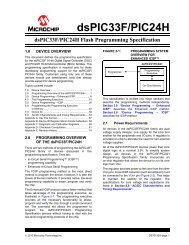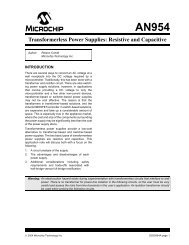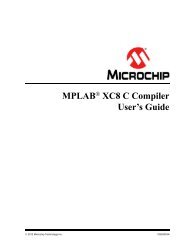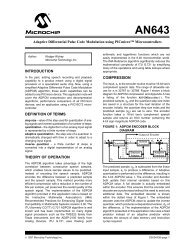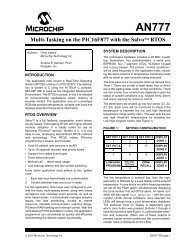MPLAB C Compiler for PIC24 MCUs and dsPIC DSCs ... - Microchip
MPLAB C Compiler for PIC24 MCUs and dsPIC DSCs ... - Microchip
MPLAB C Compiler for PIC24 MCUs and dsPIC DSCs ... - Microchip
You also want an ePaper? Increase the reach of your titles
YUMPU automatically turns print PDFs into web optimized ePapers that Google loves.
16-Bit C <strong>Compiler</strong> User’s Guide<br />
Automatic variables are owned by the enclosing function <strong>and</strong> do not need the boot<br />
attribute. They may be assigned initial values, as shown:<br />
void __attribute__((boot)) chuck_cookies()<br />
{<br />
int hurl;<br />
int them = 55;<br />
char *where = "far";<br />
splat(where);<br />
/* ... */<br />
}<br />
Note that the initial value of where is based on a string literal which is allocated in the<br />
PSV constant section .boot_const. The compiler will set PSVPAG to the correct<br />
value upon entrance to the function. If necessary, the compiler will also restore PSV-<br />
PAG after the call to splat().<br />
const<br />
Many functions do not examine any values except their arguments, <strong>and</strong> have no effects<br />
except the return value. Such a function can be subject to common subexpression<br />
elimination <strong>and</strong> loop optimization just as an arithmetic operator would be. These<br />
functions should be declared with the attribute const. For example:<br />
int square (int) __attribute__ ((const int));<br />
says that the hypothetical function square is safe to call fewer times than the program<br />
says.<br />
Note that a function that has pointer arguments <strong>and</strong> examines the data pointed to must<br />
not be declared const. Likewise, a function that calls a non-const function usually<br />
must not be const. It does not make sense <strong>for</strong> a const function to have a void return<br />
type.<br />
deprecated<br />
See Section 2.3.1 “Specifying Attributes of Variables” <strong>for</strong> in<strong>for</strong>mation on the<br />
deprecated attribute.<br />
far<br />
The far attribute tells the compiler that the function should not be called using a more<br />
efficient <strong>for</strong>m of the call instruction.<br />
<strong>for</strong>mat (archetype, string-index, first-to-check)<br />
The <strong>for</strong>mat attribute specifies that a function takes printf, scanf or strftime<br />
style arguments which should be type-checked against a <strong>for</strong>mat string. For example,<br />
consider the declaration:<br />
extern int<br />
my_printf (void *my_object, const char *my_<strong>for</strong>mat, ...)<br />
__attribute__ ((<strong>for</strong>mat (printf, 2, 3)));<br />
This causes the compiler to check the arguments in calls to my_printf <strong>for</strong><br />
consistency with the printf style <strong>for</strong>mat string argument my_<strong>for</strong>mat.<br />
The parameter archetype determines how the <strong>for</strong>mat string is interpreted, <strong>and</strong> should<br />
be one of printf, scanf or strftime. The parameter string-index specifies<br />
which argument is the <strong>for</strong>mat string argument (arguments are numbered from the left,<br />
starting from 1), while first-to-check is the number of the first argument to check<br />
against the <strong>for</strong>mat string. For functions where the arguments are not available to be<br />
checked (such as vprintf), specify the third parameter as zero. In this case, the<br />
compiler only checks the <strong>for</strong>mat string <strong>for</strong> consistency.<br />
DS51284H-page 22 © 2008 <strong>Microchip</strong> Technology Inc.





